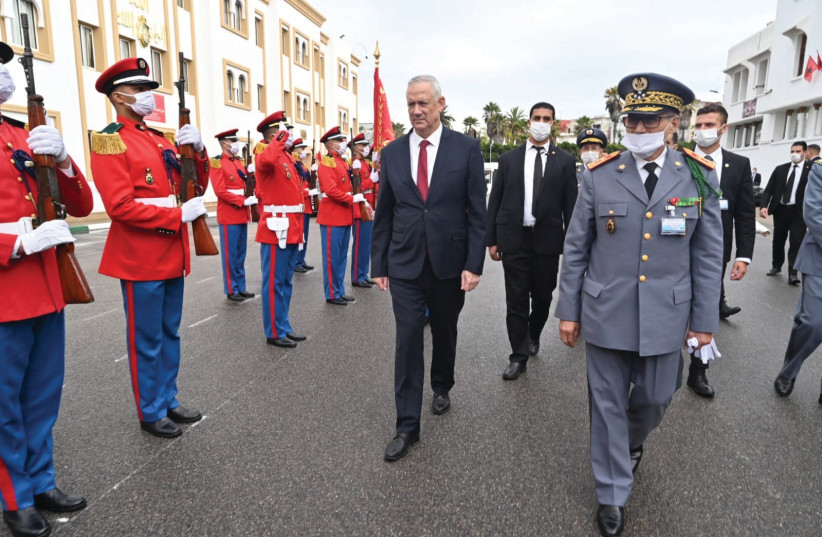Senior IDF officers in the military’s first official visit to Morocco, met with senior officers of the North African kingdom and agreed to expand military cooperation.
The Thursday meeting was held in the capital Rabat and included the heads of three IDF divisions: Maj.-Gen. Tal Kalman of Strategy and Third-Circle, Brig.-Gen. Efi Dafrin of Foreign Relations and Brig.-Gen. G. of the Operations Division.
They met with the Chief of the Moroccan military, Lt.-Gen. Belkhir el-Farouk, and senior Moroccan military officers – including the heads of the country’s intelligence and operations division in Rabat.
During the visit, Kalman shared with the Moroccan officials the IDF’s “professional structure, its regional and global challenges, and key areas from which the IDF has gathered professional knowledge and experience,” the military IDF’s Spokesperson’s Unit said in a statement on Friday.
The senior Moroccan military officials also presented the structure of the Royal Moroccan Armed Forces and the main challenges that they face.

“The officials discussed the historical and cultural connection between the countries, mutual interests in the Middle East and their desire to promote extensive military cooperation,” the IDF said in a statement on Friday.
The parties also discussed regional and global security concerns, as well as “key areas in which the IDF has gained operational knowledge and experience,” the statement continued.
The IDF staff discussed cooperative efforts with their Moroccan counterparts, including potential collaboration in intelligence, operational training and multinational exercises.
“During the visit, a memorandum of understanding was signed regarding cooperation in addition to an agreement reached by a joint military committee to sign a cooperative work plan,” the statement said, adding that a meeting was also held to discuss opportunities for participation in joint international exercises.
The announcement on the memorandum of understanding signed by the top military brass of the two countries comes after Israel Aerospace Industries (IAI) signed an agreement on Wednesday with Morocco’s industry minister to cooperate on civilian aerospace projects.
Jerusalem and Rabat reestablished ties under the Abraham Accords along with the United Arab Emirates, Bahrain and Sudan.
Morocco has had close economic, diplomatic and military ties with Israel for years. Defense Minister Benny Gantz made his first official visit to the country in December, signing a defense pact that covers intelligence and cooperation in military industries and procurement.
Morocco’s defense budget for the coming year has allocated $12.8 billion to modernize its military, and IAI is reportedly in talks with Rabat to sell it the Barak 8 medium-range surface-to-air missile system.
In addition, as part of its modernization efforts, Morocco has already received three Israeli Heron reconnaissance drones built by IAI in a deal worth some $48 million.
According to a report in Intelligence Online, the drones will be deployed to counter extremist groups and fight rebel movements in Western Sahara. The deal between the two countries was signed in 2014 and closed via the French company Dassault; the drones were received in January 2021.
In June, a Moroccan C-130 landed in Israel to take part in an international drill. It was the first time that an air force platform belonging to the North African country landed in the Jewish state.
Foreign Minister Yair Lapid visited Morocco in August and inaugurated Israel’s mission in Rabat. During his two-day visit, Lapid met with his counterpart Nasser Bourita and handed him an invitation from President Isaac Herzog for King Mohammed VI to visit Israel.
Jerusalem Post Staff contributed to this report
